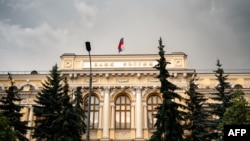The United States and other Western countries took extraordinary steps to cut Russia off from the global financial system over its invasion of Ukraine, blocking its ability to prevent a major devaluation of the ruble on foreign exchange markets, and severely limiting the ability of its banks to make international transactions.
On Monday morning, the U.S. Treasury officially announced that it had barred U.S. companies from doing business with the Central Bank of the Russian Federation, the National Wealth Fund of the Russian Federation, and the Ministry of Finance of the Russian Federation. That includes banks that hold assets belonging to any of those entities.
"The unprecedented action we are taking today will significantly limit Russia's ability to use assets to finance its destabilizing activities, and target the funds Putin and his inner circle depend on to enable his invasion of Ukraine," Secretary of the Treasury Janet L. Yellen said in a statement. "Today, in coordination with partners and allies, we are following through on key commitments to restrict Russia's access to these valuable resources."
At the same time, governments around the world, including the member states of the European Union, the United Kingdom, Japan, Singapore, Australia and others announced similar restrictions.
Those actions came on top of an international agreement to cut off some Russian banks from the SWIFT network, which banks use to facilitate international transactions. Run by the Society for Worldwide Interbank Financial Telecommunication, the SWIFT network is essential to the smooth operation of the global banking system.
Central bank sanctions
Among other things, the sanctions announced Monday block the Russian Central Bank's access to large portions of its $630 billion in foreign currency reserves.
One of the main reasons central banks hold foreign currency reserves is to allow them to protect their own currencies from sudden price changes.
"Fundamentally, the fact that the central bank has that foreign currency allows the central bank to intervene in a way that prevents a disorderly depreciation of the currency," Gian Maria Milesi-Ferretti, a senior fellow at the Brookings Institution's Hutchins Center on Fiscal and Monetary Policy, told VOA.
A major step
Milesi-Ferretti said that the decision to freeze funds belonging to Russia's central bank is practically unprecedented when it comes to a major economy.
"The only precedent I'm aware of is Iran, which had, of course, a much different level of integration with financial markets than Russia does," he told VOA.
Iran's central bank assets in the U.S. were frozen in 1979 by U.S. President Jimmy Carter after Islamic revolutionaries in that country unseated Mohammad Reza Shah Pahlavi and took American embassy personnel hostage.
The impact of the Russia freeze was immediately apparent Monday.
When markets lose confidence in the value of a currency, it costs more to exchange that currency for other currencies on the open market. For example, last week, it was possible to buy one U.S. dollar for about 80 Russian rubles. On Monday, as people and companies rushed to exchange their rubles for dollars, the price of one dollar rose to nearly 118 rubles.
The Russian central bank's foreign currency reserves could have allowed it to take some of the pressure off the ruble by using those funds to purchase rubles on the open market.
Disruptions in Russia
Reports out of Russia on Monday indicated that there was a rush among some consumers to trade their rubles for other currencies, in order to protect savings from sudden devaluation. However, there were also reports of foreign currency shortages.
In addition, other reports suggested that the commonly used mobile payment systems Apple Pay and Google Pay had ceased functioning for some users over the past several days. The outage appears to be the result of individual Russian banks being targeted by sanctions, which made it illegal for U.S. firms, such as Apple and Google, to do business with them.
Major international corporations Monday announced that they were divesting from partnerships with Russian firms. British Petroleum announced that it would abandon its 20% stake in the state-owned energy firm Rosneft. Other major firms, including the oil firm Shell and the banking firm HSBC, also announced that they were severing financial ties with Russian partners.
The havoc led Russian regulators to close the country's stock and derivatives markets Monday.
SWIFT impact
Cutting off Russian banks from SWIFT has been called the "nuclear option" of financial sanctions, but it does not make it impossible for the Russian banks to transact with other banks in the world. What it does is make the process far less efficient.
SWIFT is a messaging service that lets banks quickly and securely verify the identity of the banks and individuals involved in an international transaction. However, there is nothing to prevent Russian banks from using other means of communications.
Nicolas Véron, senior fellow at Peterson Institute for International Economics, also a senior fellow at Bruegel, a Brussels-based economic policy think tank, told VOA that limiting SWIFT access – especially when applied to only some Russian banks, is not the death blow that many believe it to be.
"I think this metaphor of the nuclear option is a bit unfortunate because it doesn't kill anybody," he said. "It makes life more complicated for Russian banks, but it doesn't actually prevent transactions [from being] executed and completed. It just makes everything more complicated because SWIFT is very convenient when you have it."
Mandarin Service reporter Yinan Wang contributed to this story.




